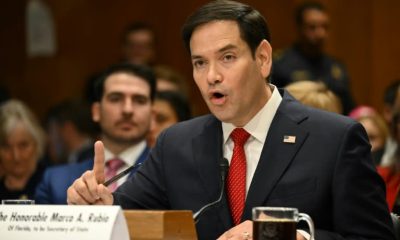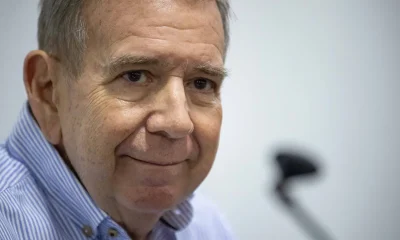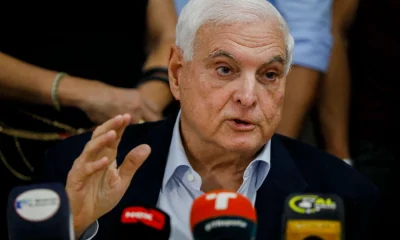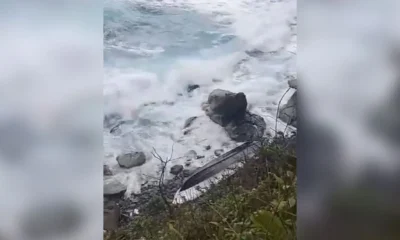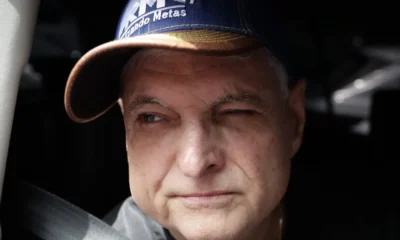International
Rómulo Roux, the presidential candidate who promises a Constituent Assembly to refound Panama
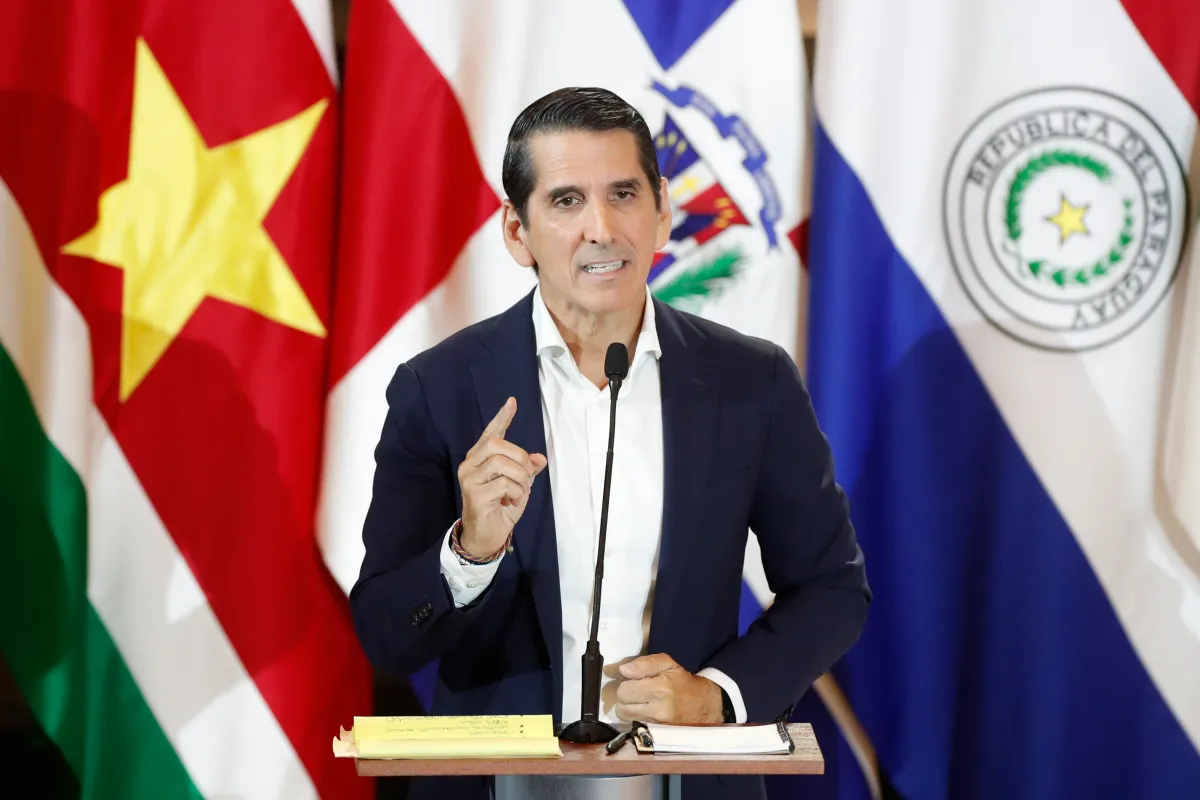
Rómulo Roux, leader and presidential candidate of the opposition Democratic Change (CD) party of Panama and who came second in the 2019 elections, is considered a politician who does not live off the system.
This gives it the power to carry out its main objective: a new Magna Carta that refounded Panama and frees it from corruption.
“I’m not a professional politician, I don’t live off the system, I don’t live on my donors, and that gives me the freedom to make the decisions that the country requires them to be made,” such as changing the Constitution through a constituent assembly,” the lawyer and doctor of law said in an interview with EFE.
Roux, standard-bearer of the traditional CD and Panameñista Party (PPa) and third in the most recent survey published by the newspaper La Prensa, tries again to reach the presidency of Panama with a series of basic columns, including economics, education and the reform of public institutions.
Winning, apart from “punctual” proposals such as creating 500,000 jobs and tripling, up to five million, the number of annual visitors to the country, he intends to leave the change of the 1972 Constitution as one of its “legacys”.
This new legal framework is needed, among others, “to eliminate the number of deputies (71), lower it to no more than 51 deputies and that they cannot raise their own budget when they feel like it, that they cannot take the Executive hostage.”
“Yes (refound), give the country a structure and a new legal framework that eliminates a system that today is made to shield the thugs, to shield corruption, to shield impunity. That system has already collapsed,” said Roux, born in Panama in 1965.
He admitted, however, that cases of corruption such as Odebrecht’s have been of people within the traditional political parties “who have done things wrong.”
But between fleeing “as others have done, one can choose to reform the party, ensure that it operates as it has to operate and that it does things right.”
“Those who want the usual path, the path of politicking, clientelism, malantry, I don’t even want them here,” he remarked.
Roux is fighting for the presidency for the period of 2024-2029 with former president Martín Torrijos (2004-2009) for the Popular Party (PP); the current vice president José Gabriel Carrizo for the Democratic Revolutionary Party (PRD) and the Molirena; and Ricardo Lombana for the Movimiento Otro Camino (Moca) party.
His opponents are also former Minister José Raúl Mulino for the Realizing Goals (RM) collective and the Alianza Party (PA) instead of former President Ricardo Martinelli (2009-2014) – politically disqualified after being convicted of money laundering – and the candidates for the free application Melitón Arrocha, Maribel Gordón and Zulay Rodríguez.
Closely defeated in the 2019 elections by Laurentino Cortizo, Roux recalls that he always said that he “had doubt whether the official result reflected the will of voters at the national level in number of votes in different popular election positions.”
Even so, he now considers that the electoral system at that time “was what it was, and we decided to move forward for five more years, fight and be this May 5 again, to win the presidency.”
In that way, whoever was head of Foreign Affairs and minister for Channel Affairs with Martinelli’s government (2009-2014) points out that nothing distracts him, not even those who talk about his ‘American nationality’, something he denies and assures is a “dirty” campaign that comes from the disabled former president and Mulino, who leads the most recent survey with 29%.
“Why is it me who is attacked the most, if he says that they are flying in the polls? That they attack other candidates. Do they have an ass (fear)?” he said.
Roux, who claims to have his “own polls” and find out what happens while touring the country, affirms that he is not worried about his rivals either, but that it is important is that the Supreme Court of Justice “decide quickly” on the complaint of unconstitutionality against Mulino’s candidacy, “not to remove candidates, but to eliminate uncertainty.”
The lawsuit was filed on March 4 by a lawyer considering that, after the Electoral Tribunal disqualified Martinelli, Mulino’s candidacy is not valid because she was not subjected to primaries and also violates constitutional articles on the election of the president and the vice president of the country.
Among the issues that have marked the debate in the electoral campaign is that of the Cobre Panama mine, of the Canadian First Quantum Minerals (FQM) and disabled by a court ruling last November after massive protests against mining activity.
The issue has persecuted Roux for his relationship with one of the law firms involved in the signing of the first contract of the mining concession, but he responded without hesitation to EFE’s question about the fact that, in case of winning the presidency, things vary and the mine stays to continue operating.
“No, the mine is leaving. The mine is leaving because there is already a ruling from the Court and the people spoke,” he said, but that it must be “closed in an orderly manner and that it does not cost the country anything. Always close it, taking care of the environment.”
International
U.S. Senate Rejects Budget, Bringing Government Closer to Shutdown Amid DHS Dispute

The U.S. Senate voted on Thursday against a budget proposal in a move aimed at pressuring changes at the Department of Homeland Security (DHS), following the killing of two civilians during a deployment of immigration agents in Minneapolis.
All Senate Democrats and seven Republican lawmakers voted against the bill, which requires 60 votes to advance, pushing the country closer to a partial government shutdown that would cut funding for several agencies, including the Pentagon and the Department of Health.
The rejection came as Senate leaders and the White House continue negotiations on a separate funding package for DHS that would allow reforms to the agency. Proposed measures include banning Immigration and Customs Enforcement (ICE) agents from wearing face coverings and requiring them to use body-worn cameras during operations.
The vote took place just hours after President Donald Trump said he was “close” to reaching an agreement with Democrats and did not believe the federal government would face another shutdown, following last year’s record stoppage.
“I don’t think the Democrats want a shutdown either, so we’ll work in a bipartisan way to avoid it. Hopefully, there will be no government shutdown. We’re working on that right now,” Trump said during a Cabinet meeting at the White House.
International
Trump Says Putin Agreed to One-Week Halt in Attacks on Ukraine Amid Extreme Cold

U.S. President Donald Trump said on Thursday that he secured a commitment from Russian President Vladimir Putinto halt attacks against Ukraine for one week, citing extreme weather conditions affecting the region.
“Because of the extreme cold (…) I personally asked Putin not to attack Kyiv or other cities and towns for a week. And he agreed. He was very pleasant,” Trump said during a Cabinet meeting broadcast by the White House.
Trump acknowledged that several advisers had questioned the decision to make the call.
“A lot of people told me not to waste the call because they wouldn’t agree. And he accepted. And we’re very happy they did, because they don’t need missiles hitting their towns and cities,” the president said.
According to Trump, Ukrainian authorities reacted with surprise to the announcement but welcomed the possibility of a temporary ceasefire.
“It’s extraordinarily cold, record cold (…) They say they’ve never experienced cold like this,” he added.
Ukrainian President Volodymyr Zelensky later commented on the announcement, expressing hope that the agreement would be honored.
International
Storm Kristin Kills Five in Portugal, Leaves Nearly 500,000 Without Power

Storm Kristin, which battered Portugal with heavy rain and strong winds early Wednesday, has left at least five people dead, while nearly half a million residents remained without electricity as of Thursday, according to updated figures from authorities.
The revised death toll was confirmed to AFP by a spokesperson for the National Emergency and Civil Protection Authority (ANPEC). On Wednesday, the agency had reported four fatalities.
Meanwhile, E-Redes, the country’s electricity distribution network operator, said that around 450,000 customers were still without power, particularly in central Portugal.
Emergency services responded to approximately 1,500 incidents between midnight and 8:00 a.m. local time on Wednesday, as the storm caused widespread disruptions.
The Portuguese government described Kristin as an “extreme weather event” that inflicted significant damage across several regions of the country. At the height of the storm, as many as 850,000 households and institutions lost electricity during the early hours of Wednesday.
Several municipalities ordered the closure of schools, many of which remained shut on Thursday due to ongoing adverse conditions.
Ricardo Costa, regional deputy commander of the Leiria Fire Brigade, said residents continue to seek assistance as rainfall persists.
“Even though the rain is not extremely intense, it is causing extensive damage to homes,” he noted.
In Figueira da Foz, a coastal city in central Portugal, strong winds toppled a giant Ferris wheel, underscoring the severity of the storm.
-

 Central America3 days ago
Central America3 days agoGuatemala seizes over a ton of cocaine hidden in flour at Pacific port
-

 International5 days ago
International5 days agoDelcy Rodríguez seeks political agreements after Maduro’s ouster
-

 International3 days ago
International3 days agoHistoric snowstorm paralyzes Toronto after 60 centimeters of snow
-

 International3 days ago
International3 days agoSpain’s irregular migrant population rises to 840,000, study finds
-

 Central America2 days ago
Central America2 days agoGuatemala Police Arrest Prison Guard Caught in the Act of Extortion
-

 Central America2 days ago
Central America2 days agoHonduras swears in conservative president Asfura after disputed election
-

 International5 days ago
International5 days agoFederal immigration agents kill man in Minneapolis, sparking protests and outrage
-

 International1 day ago
International1 day agoFootball Fan Killed in Clashes After Colombian League Match
-

 Central America2 days ago
Central America2 days agoBukele leads public trust rankings as UCA survey highlights gains in security
-

 International2 days ago
International2 days agoWinter Storm Fern Leaves 30 Dead and Over One Million Without Power Across the U.S.
-

 International2 days ago
International2 days agoDoomsday clock moves to 85 seconds before midnight amid rising global risks
-

 Sin categoría2 days ago
Sin categoría2 days agoEight Killed in Series of Armed Attacks in Ecuador’s Manabí Province
-

 International3 days ago
International3 days agoRights group says nearly 6,000 killed in Iran protest crackdown
-

 International1 day ago
International1 day agoMissing Spanish Sailor Rescued After 11 Days Adrift in Mediterranean
-

 International1 day ago
International1 day agoRubio Says U.S. Could Participate in Follow-Up Russia-Ukraine Talks
-

 Central America1 day ago
Central America1 day agoGuatemala President Says Starlink Terminal Found Inside Prison
-

 International2 days ago
International2 days agoSpain approves plan to regularize up to 500,000 migrants in Historic Shift
-

 Sin categoría2 days ago
Sin categoría2 days agoEl Salvador Launches Fourth Year of Ocean Mission to Protect Marine Ecosystems
-

 International3 days ago
International3 days agoVenezuela frees at least 80 political prisoners, NGO says
-

 International3 days ago
International3 days agoEU launches new probe into X over AI-generated fake nude images
-

 International3 days ago
International3 days agoFrance debates ban on social media for children under 15
-

 International3 days ago
International3 days agoSevere winter storm grips U.S., leaves multiple dead as extreme cold persists
-

 International5 hours ago
International5 hours agoU.S. Senate Rejects Budget, Bringing Government Closer to Shutdown Amid DHS Dispute
-

 International5 hours ago
International5 hours agoMan Arrested After Vehicle Crashes Into Jewish Institution in Brooklyn
-

 International5 hours ago
International5 hours agoStorm Kristin Kills Five in Portugal, Leaves Nearly 500,000 Without Power
-

 International5 hours ago
International5 hours agoTrump Says Putin Agreed to One-Week Halt in Attacks on Ukraine Amid Extreme Cold



























